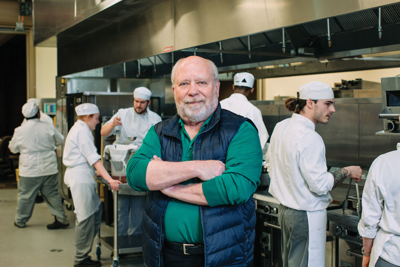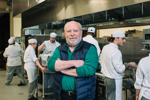Randy Rayburn was the ultimate yes man. Can you help us with this project? Yes. Can you donate to this cause? Yes. Can I get a table for six in the private room and sneak my guests in through the kitchen? Yes. Can you give this lost kid a second chance? Yes.
News of the legendary, standard-setting restaurateur’s sudden death Thursday afternoon spread like wildfire through every segment of the Nashville community. So quickly that by the time the CEO of one company texted another, by the time a former mayor texted a former congressman, by the time a server texted a chef, by the time a student of the Randy Rayburn School of Culinary Arts texted an instructor, by the time a record label head texted the executive director of an arts organization — "Have you heard?" — the reply was almost unanimously and simply "Randy."
If you get a few Nashville chefs or restaurateurs together in a room, it won’t take long before the conversation turns to the issue of staffin…
One of the many times I wrote about him, I said that in his career, “Randy Rayburn has fired, hired or fed everybody in Nashville.” He cherished the description.
That was back in the early ’90s — when Nashville was still a big small town — in a story about Sunset Grill, the restaurant he opened in 1990. The impact Sunset had on the dining scene and the entire community cannot be overstated. It introduced California cuisine, Paul Harmon’s art, late-night dining, endless wine lists and elevated nachos. It was the scene to see and be seen, the place where countless clients were wooed, introductions made, alliances brokered, deals struck. Had a giant sinkhole suddenly swallowed Sunset’s dining room, Metro, Capitol Hill, downtown business and Music Row would have come to halt.
Like every successful independent restaurateur, Rayburn — whose path to Sunset included stints at the Opryland Hotel, F. Scott’s and Third Coast — was always, without fail, in the house. He greeted people as they arrived, touched every table, remembered every name. He knew every secret, and most importantly, he kept them.
One of Nashville’s greatest connectors and most tireless cheerleaders, he was one of the first called to sign on to and legitimize a project. NFL? Yes! Hell yes, said Rayburn. Music City Center? He listened to the naysayers, then shut them down and pushed ahead. He gave his name, time and talents to elevate the culinary program at Nashville State. Beyond the flash, he led or worked side by side with grassroots efforts to feed the food insecure in the community, and get people back on their feet after flood, fire and profound loss. He said yes over and over and over again.
If the Metro Arts Commission ever decides Nashville’s next big piece of public art should be a Mount Rushmore of the city’s culinary heroes, t…
That included purchasing the 10-year-old Midtown Cafe from a colleague in 1997. When Sunset closed in 2015, he moved his base of operations there, seamlessly ushering in the power-breakfast-and-business-lunch crowd, then slipping out to spend evenings with his beloved sons Duke and Dean. He came to fatherhood late in life, and as with everything else he did, he embraced it fully, often saying he just wished he had done it sooner.
Social media sites are awash with bereaved, heartbroken, poignant tributes to Randy, the man raised on a farm in Milan, Tenn., who earned status as a one-name institution and was on a first-name basis with thousands.
Rayburn understood that possibility and achievement are woven with hospitality and generosity. For all who remember Nashville as a big small town, it is inconceivable that Randy Rayburn will not be at a host stand, a board table or elbow-deep in the mix. Those today drawn to Nashville — a big small city with unlimited aspirations — have him to thank for opening the door and saying, "Welcome, come in, join us at the table."







